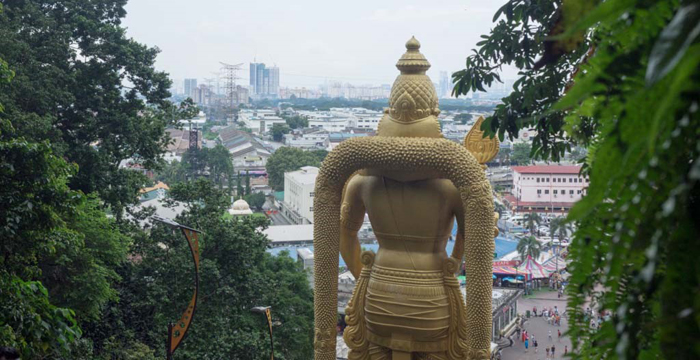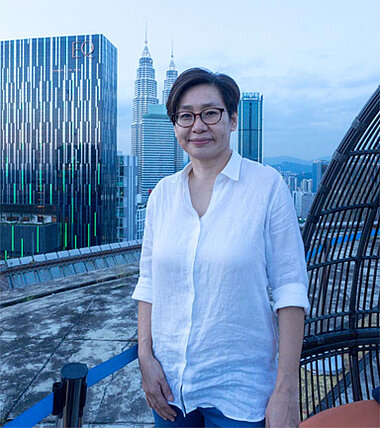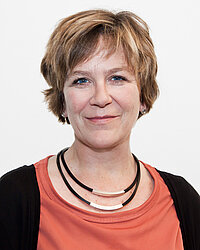Between Tradition and Modernity
Film Censorship, Age Classification and Self-Regulation in Malaysia
Basically: forbidden!
Article 10 of the Malaysian Constitution guarantees freedom of speech and opinion, but also outlines possible exceptions: in the interests of national security, international relations, public order and morality, the protection of Parliament, the Legislative Assembly and the courts, and the prevention of crime, the government may restrict freedom of expression. Films classified as dangerous according to these criteria may not be screened.

The Malaysian censorship authority Lembaga Penapis Filem (LPF), which reports to the Ministry of the Interior and operates on the basis of the Film Censorship Act 2002 (FCA), is responsible. The law provides for a ban in principle, subject to permission: all films that are to be shown publicly in cinemas or at film festivals require LPF approval. The same applies to films released on DVD or distributed on television and on VoD platforms. Various television stations have set up their own editing workstations where trained “content editors” edit content according to censorship guidelines. There is an exception for the pay platform Astro, which offers access to over 200 satellite channels and is responsible for implementing the censorship regulations itself. LPF monitors whether this is carried out.
The censorship authority is also responsible for the age rating of films. The three age categories are “U” for films without age restriction, “P13” for films which those under age 13 may only view when accompanied by a parent, and “18” for adult content.
According to LPF Chairman Mohd Zamberi Abdul Aziz in an interview with The New Straits Times2, the three levels are to be supplemented by a further label – “from 15” or “from 16”. However, it is unlikely that the introduction of a new rating category will reduce censorship as Zamberi promises. The list of total bans is too long and the conviction too deeply rooted that “certain things” must not be shown or said. In a country with a Muslim majority, prohibited content includes not only depictions of nudity, sexuality and especially LGBT sexuality, but all elements that could lead to social controversy in religious, socio-cultural or moral terms. The Guidelines on Film Censorship3 and their more than 100 bans impressively demonstrate that the potential for social tensions in multi-ethnic Malaysia is quite high.
Representations of violence against the rule of law, of environmental pollution or dangerous misconduct, scenes that encourage wicked acts, show an uninhibited and unprincipled lifestyle or criminal acts as profitable, mystical or superstitious elements, the mockery of political leaders, scenes of oppression, the victory of evil over good – the guidelines list a wide range of inadmissible content. Moreover, they are so broadly formulated that they can be applied to all kinds of representations.
Eight films were banned in 2018, explains Zamberi, mainly because of LGBT elements and extreme representations of sexuality. These include the US comedy The Happytime Murders with its cocaine snorting and ejaculating Brian Henson dolls and the Chilean drama Una Mujer Fantástica about the transgender woman Marina. The animated film Bilal, produced in the United Arab Emirates, was not allowed in Malaysian cinemas because it shows a different Islamic faith than the Sunni one, which according to censorship regulations could lead to disagreement in the country’s Muslim community. The Bollywood epic Padmaavat was banned because of its negative portrayal of Muslims – in the story, Sultan Jalaluddin Khilij, who ruled Afghanistan in the 13th century, is the villain.
Sensitivities everywhere
Even individual statements and short scenes are said to have a great impact, as the active editing practice of the censorship authority evidences: of 2,283 approved films in 2018, 677 films were only released to the public in edited versions. Due to Disney’s refusal to release the live-action version of Beauty and the Beast in a version that had been adjusted to eliminate appearance of the gay character Le Fou, this case became public. Numerous other films are edited without any public discussion or criticism. The reasons for the cuts are not always coherent. Why Rami Malek as Freddy Mercury in the Queen film Bohemian Rhapsody is not allowed to say “I have AIDS” remains with the Malaysian censorship authority.
The official editing practice devolves into absurdity when, for time or economic reasons, the incriminated scenes are not removed, but merely concealed during the screening. “Employees at film festivals or public cinema evenings have to follow the editing lists of the censors and hold a piece of paper in front of the projector at the decisive points,” explains Rolf Stehle, Director of the Goethe Institute Malaysia, regarding so-called “manual blocking”, which is also used at the Institute’s own film events. The main casualties are vulgar linguistic expressions and representations of sexuality that go beyond allusions: even a fleeting kiss on the lips with an appropriate body distance is not allowed, much less a discreetly suggested sexual act or words like “fuck” or “bitch”. However, the sound is not muted at the concealed points, which is why such vulgar expressions – internationally widely known – can still be heard. With the passionate moaning, a film of its own is likely running in the minds of the viewers despite the black image. “Everyone is embarrassed until someone laughs and relaxes the situation in the dark cinema,” says Stehle. In fact, it’s not really the sex noises that embarrass people, but rather the outmoded paternalism. Darkening of the screen for too long or too often also generally leads to dissatisfaction and verbal expressions of annoyance from the audience.
In the age of the Internet and streaming, this form of censorship may seem hapless and laughable from a Western point of view where harmless sex scenes are affected. Where political films that deal with human rights violations and criticise society are concerned, however, the restrictive regulations represent a very serious obstacle. In which cases national security, international relations or public order and morality are affected such that a restriction of freedom of expression seems justified is after all a broad field, and examples of suppressed historical facts and political statements are numerous. In 2013, for example, the film No Fire Zone: The Killing Fields of Sri Lanka, which deals with war crimes committed by the Sri Lankan army at the end of the civil war, was banned out of respect for the Sri Lankan government. Lena Hendry, an activist and employee of the human rights organisation Pusat Komas, was indicted and sentenced to a fine of RM 10,000 for showing the film without prior authorisation.4 In 2016, the film Sindiket was banned, as it revealed that migrants from Indonesia and the Philippines had been granted citizenship in exchange for votes for the incumbent government. In 2017, it was the award-winning film Absent without Leave about the grandfather of director Lau Kek Huat, who had been a member of the Communist Party.

“The restriction possibilities are so indeterminate and wide-ranging that censorship remains a boundless discretion,” says Anna Har, Managing Director of the Freedom Film Network (FFN). This network of human rights activists and social filmmakers has been committed to freedom of expression and values in Malaysia for years. With the annual international documentary film festival FreedomFilmFest, the FFN offers a forum for films with social and human rights content and for the free and critical discussion of socio-political topics. Since its foundation in 1993, the festival has repeatedly received requests from the Ministry of the Interior to have all films approved by the censorship authority prior to screening. “We are of the opinion that film screenings do not require the approval of a government authority,” Anna Har explains regarding the position of the FFN. “Especially if the films are meant for adults and serve the aim of political education, promote critical discourse and are intended for non-commercial purposes. The country should do away with censorship and instead promote literacy and media competence among its citizens.”
In the borderless digital world, censorship measures are becoming less and less enforceable anyway: the producers of Absent without Leave, for instance, reacted to the ban on screening by making the film available free of charge on the Internet.5
Mental divide
In the course of the change of government in 2018, pressure on the censorship authority LPF has been increasing. The promises of reform, the increasingly obvious contradictions between conventional censorship and technological development, the availability of otherwise strictly controlled and taboo content on the Internet – these factors and others have led to censorship and possible alternatives being discussed more openly in Malaysia today than just a few years ago. At a discussion event organised by the FFN and supported by the Alliance Française and the Goethe Institute Kuala Lumpur in June 2019, problems of censorship, contemporary forms of media regulation and models of self-regulation were discussed.
For the online sector, Malaysia already has an industry self-regulatory body: the Communications and Multimedia Content Forum (CMCF) has developed a voluntary code of conduct (Content Code) based on the Communication and Multimedia Act 1998 (CMA) for broadcasting and Internet companies, which, according to CMCF Chairman Ahmad Izham Omar, contains the minimum standards that programmers should internalise. Content that can be perceived as offensive, insulting or threatening should be avoided; as with film censorship, these principles can be interpreted very broadly. Viewer complaints regarding alleged violations of the principles show that the common denominator for the evaluation of films and television programmes in Malaysia is very small.
Society is deeply divided. “The majority of the population wants censorship measures, manual blocks and cuts, and they want the government to organise censorship for them,” says Izham. The filmmakers gathered at the event, on the other hand, feel unacceptably constrained. They see no justification for the curtailment of their freedoms, as everything can be seen on Astro or Netflix anyway. Not everyone is ready for every kind of content, says Izham. “If my uncle knew what was on Netflix …” The consensus is that society is still learning how to handle the new media diversity. Media campaigns and programmes for media education and training in schools would be desirable. However, there is a lack of political will and pedagogical competence. One teacher puts it in a nutshell: “Most teachers don’t want their children to be critical at all.”
Rigid censorship regulations and traditional moral concepts lead to a mental divide. Anna Har sees the creativity of filmmakers curtailed because certain topics are avoided from the outset. “It must be possible to make a film about the situation of the Rohingya without thinking about relations between Malaysia and Myanmar,” says Har. Mahzan Yusuf’s answer from the censorship authority shows that there is still a long way to go before media freedom is achieved in Malaysia: the LPF doesn’t so much want to inhibit filmmakers, but rather support them. It would be possible to offer assistance as early as the script phase, for instance, and point out content that could be problematic with respect to censorship. After all, any film can be shown – as long as it meets the requirements.
Outlook
It remains to be seen how serious the LPF is about reforms. The FreedomFilmFest 2019 took place from 21 to 28 September and once again featured films that some found problematic. “We must not hide these controversial issues in order to protect the citizens or the country,” says Anna Har. “Only in a culture of open discussion can knowledge and thoughts flow freely.” The Freedom Film Network and the Goethe Institute in Kuala Lumpur want to continue their efforts to promote such a culture. In their programmes for the coming years, they will focus intensively on the topics of media, censorship and film classification. In July 2019, they won a call for projects from the European Commission to promote development of civil society in Malaysia. Further strengthening of civil society structures will be essential for maintaining the reform process in Malaysia that began after the 2018 elections.6
Comments and sources:
1) Bedi, Rashvinjeet S.: Malaysia jumps up 22 places in latest Press Freedom Index. The Star online from 18.04.2019
2) Teoh Pei Ying: New Film Classification Will Reduce Censorship. Interview with Mohd Zamberi Abdul Aziz in the New Straits Times of 09.07.2019
3) The English version of the guidelines begins on page 81 of this document: http://lpf.moha.gov.my/lpf/images/Perundangan/GARIS_PANDUAN_PENAPISAN_FILEM(1).pdf
4) Malaysia Human Rights Report 2017, Overview, p. 25: https://www.fidh.org/IMG/pdf/hr_overview_2017_digital_edition_.pdf
5) Banned in Malaysia, producers show movie for free online instead. Malaymail from 21.02.2017
6) This is the translation of the German text Zwischen Tradition und Moderne. Filmzensur, Altersklassifizierung und Selbstregulierung in Malaysia, in tv diskurs 90, 4/2019, and online at https://tvdiskurs.de.

